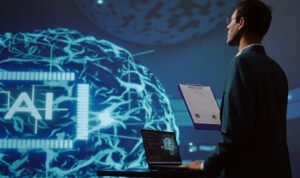1. Enhanced Creativity and Collaboration
Generative AI will become an integral tool for creative professionals, enabling them to brainstorm ideas, generate drafts, and refine content. Artists, writers, and designers will collaborate with AI to create innovative works, leading to a new era of hybrid creativity where human intuition and AI capabilities blend seamlessly.
2. Personalized Content Creation
By 2025, generative AI will provide hyper-personalized content tailored to individual preferences and behaviours. Businesses will use AI to create customised marketing materials, product recommendations, and user experiences, enhancing customer engagement and satisfaction.
3. Real-Time Content Generation
Advancements in generative AI will allow for real-time content creation across various platforms. For instance, social media posts, news articles, and marketing copy can be generated instantly based on current trends and audience sentiment, helping brands stay relevant and responsive.
4. Improved Language Models
The evolution of language models will enable generative AI to understand context, nuance, and emotion more effectively. This will enhance applications such as chatbots and virtual assistants, making interactions more natural and engaging for users.
5. Ethical and Responsible AI Development
As generative AI becomes more prevalent, there will be a stronger emphasis on ethical considerations. Companies will implement guidelines to prevent misuse, address biases, and ensure transparency in AI-generated content. This will help build trust with users and promote responsible AI use.
6. Integration with Other Technologies
Generative AI will increasingly integrate with other emerging technologies, such as augmented reality (AR) and virtual reality (VR). This will enable the creation of immersive experiences where users can interact with AI-generated environments and scenarios in real time.
7. Advanced Training Techniques
By 2025, training techniques for generative AI will become more sophisticated, allowing models to learn from smaller datasets and adapt quickly to new information. This will improve the quality and relevance of generated content across various domains.
8. Industry-Specific Applications
Different industries will see tailored applications of generative AI. For example, AI can help generate patient reports and treatment plans in healthcare. In entertainment, it could create scripts or music. These specialised applications will streamline workflows and enhance productivity.
9. Community and Collaboration Platforms
Generative AI will foster the creation of community platforms where users can share AI-generated content, collaborate on projects, and provide feedback. These platforms will encourage innovation and collective creativity, driving new trends in various fields.
10. Democratization of Content Creation
As generative AI tools become more accessible, individuals and small businesses will have the ability to produce high-quality content without needing extensive resources. This democratisation will empower more voices to be heard and foster diverse perspectives in creative industries.
Conclusion
In 2025, generative AI will be a cornerstone of creativity and innovation, reshaping how we create, interact, and consume content. As it evolves, the collaboration between humans and AI will unlock new possibilities, transforming industries and enhancing how we experience the world.
Get Involved!
- Stay Informed: Subscribe to our newsletter for the latest updates on generative AI and its implications for your industry!
- Ready to Leverage Generative AI? Schedule a free consultation with our experts to explore how generative AI can benefit your business.
- Share Your Thoughts: Take our quick survey on your experiences and challenges with AI, and receive personalised insights based on the results.
- See It in Action: Book a demo today to experience our generative AI tools firsthand and discover how they can elevate your creative processes.






